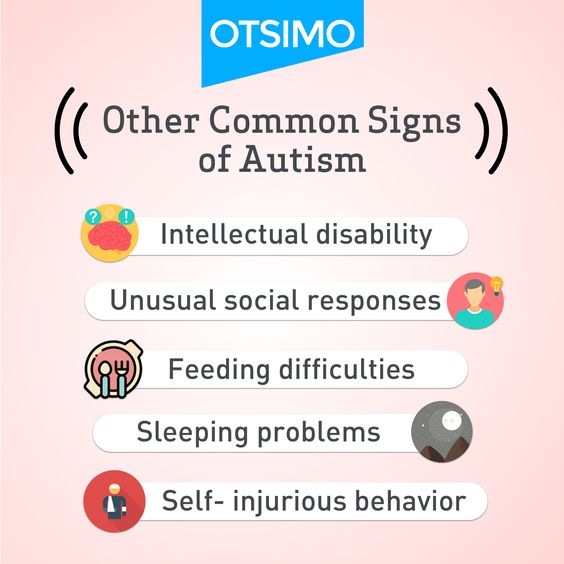In individuals with autism, extreme (hyper) or low (hypo) sensory overload issues is one of the most common problems. Their senses seem to be acutely working or not working at all.
People with autism are often involved in inflexible activities. Often these activities are self-stimulating.
- Swinging
- Rotating
- Flapping hands
- Touching everything
- Watching rotating objects
What is Sensory Overload
Sensory overload is when a person’s senses are overstimulated by outside stimuli. Sensory overload can happen to virtually anyone. However, this sensation is most commonly seen with people who have autism spectrum disorder (ASD), sensory processing disorder, or other neurodevelopmental disorders.
Sensory Overload Symptoms
The symptoms of sensory overload can change from one person to another. Varying thoughout a spectrum, some may feel mild effects in their lives resulting in slight discomfort, while for others the symptoms are debilitating and they feel like they can’t function until their senses normalize.
Also, not all or the same senses are affected for all people. While some may experience overload with their visual sense, others may experience difficulty with their auditory sense. It is also common that more than one sense is affected.
Here are some symptoms and signs of sensory overload that may be shared:
- Anxiety
- Fear
- Anger and irritability
- Difficulty with sleep
- Feeling agitated
- Feeling overwhelmed
- Inability to ignore the stimuli causing discomfort
- Stress
- Panic attacks
What Causes Sensory Overload
The cause of sensory overload lies in the brain’s way of receiving more information and stimuli through senses that are more than it can process. Triggers that would not be noticeable by people who developed neurotypically could cause distress to those with sensory overload disorder. There are some general sensory overload triggers:
Come along with 200k+ families!
Explore the endless possibilities of learning!
Download for Free.
Touch triggers
Certain textures or materials can trigger sensory overload. Everyday items like clothing or certain foods may make people with sensory overload disorder feel discomfort. They may even feel pain. Also sometimes harsh or bright lights can cause people to feel sensory overload.
###Visual triggers
When too much is going on, sensory overload can occur. At a crowded mall or videos with complex and moving visuals can trigger sensory overload.
###Auditory triggers
Loud noises or multiple sounds going at the same time may cause auditory overload.
###Smell triggers
People may find perfumes or the smell of certain pungent food overwhelming. People with sensory overload tendencies may notice smells that others might not. Strong smells disturb people with sensory overload and they may avoid places with strong smells, like kitchens or stores. They also refuse to eat certain foods due to their smells.
###Taste triggers The flavor or temperature of foods may trigger sensory overload.
How to Deal with Sensory Overload
In order to start dealing with the symptoms of sensory overload, one first have to know which senses get overwhelmed. Recognizing the triggers is the way to manage the triggers. Once you know what causes sensory overload, you can follow strategies to avoid getting into situations that may include triggers.
Finding out the causes and developing coping mechanisms is the most effective way of dealing with sensory overload. Here are some steps to take:
Identify what causes the triggers: This helps to prepare for when the triggers happen. Optimize living space: If you notice there is a stimulus causing sensory overload, try removing it from your living space, such as bright lights. Establish and stick to a routine: This will help identify the causes of triggers and will help you find a way that is least triggering when you are going about your day.
Sensitivity Differences in Autism – Sensory Overload
Sensory Overload in people with autism means that their views are very sharp. For example, they pay attention to the fluffy pieces on the carpet or complain about airborne dust, they do not like bright lights, and they may even be afraid of extreme light flashes. Children with sensory overload can even notice the vibrations of light under fluorescent lights and the whole room vibrates for them. People with hyper-hearing often sleep very lightly, fear sudden unpredictable sounds (eg phone rings, baby cries), they can even be horrified by the storm, crowd, and a haircut. They usually close their ears when noise is painful for them, but others in the room may not be aware of any disturbing noise. Sometimes, children with sensory overload make repetitive noises to block other disturbing noises.
Come along with 200k+ families!
Explore the endless possibilities of learning!
Download for Free.
Children who have sensory sensitivities especially based on sense of smell can not tolerate the smell of humans or objects while their families may be unaware of any odor. Since they experience the sensation of smell, they get away from people and they try to wear the same clothes all the time. For some of them, any food smell or taste can be very strong and they refuse to eat no matter how hungry they are. Some people with autism do not want to be touched by others. When people try to hug them, they withdraw themselves because they are afraid of being touched. Even the slightest touch can make them have a panic attack. Most people refuse to wear certain clothes because they can not tolerate the texture on their skin. Some children with autism react excessively to heat/cold and avoid wearing shoes. Children with vestibular sensory overload have difficulty in walking or running on nonsmooth or uneven surfaces and in changing directions. Individuals with proprioceptive sensory overload hold their bodies in strange positions and have difficulty manipulating small objects.
Hypersensitivity in Autism
Some children with autism are hypersensitive, so seeing, hearing, or feeling something makes them feel bad. They can shake their hands, move back and forth, or make strange noises to activate their senses.
Children with sensory overload can have trouble understanding where objects are, only when they see their frame, they realize what they are. They can look at the lights, focus on the sun or a bright light bulb. When they enter an unfamiliar room, they have to touch everything by going around in order to sit down.
Autistic people who have sensory overload tend to search for sound and listen to the most treble sound by leaning against electronic devices. They like the noisiest places in their house and do things such as knocking on the door, tearing paper, or ruffling it to increase their hearing senses. They want to chew and smell everything and do not feel pain or warmth.They may not notice an injury caused by a sharp object or be aware of a broken bone. They tend to harm themselves and they feel only what they live by biting their hands and hitting their heads to walls. They like screening under pressure, within tight clothes, usually under heavy objects. Child with sensory who has vestibular hypersensitivity will enjoy the fun and seek out any kind of activity. They can turn around for a long time without being dizzy or nauseating.

Sources:
- Integrated Treatment Services / Sensory Processing Disorder In Autism:
http://integratedtreatmentservices.co.uk/blog/sensory-hyper-hyposensitivity-autism/
- The National Autistic Society / Sensory issues:
http://www.autism.org.uk/sensory
Last Updated: December 4, 2021





